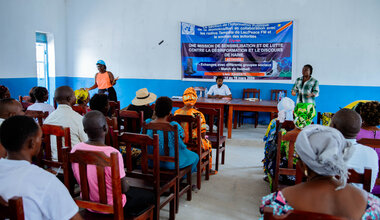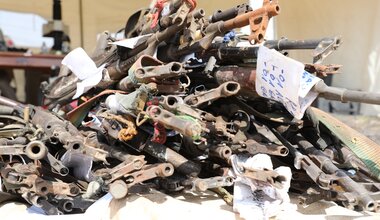The United Nations World Refugee Day:
Martin Kobler, Chief of MONUSCO calls for protection of refugees and peaceful conditions at their home countries
Kinshasa, 20 June 2015 – “Refugees are human beings, affected by the hostile situation in their countries and forced to take refuge in another country. They need our attention and we should protect them: one refugee without hope too many”, said Martin Kobler.
Out of 106,228 Burundians who have taken refuge in neighboring Great Lakes countries, about 10,590 have been registered in the South Kivu province of the DRC after finding circumstances and conditions of life unfavorable to their existence in Burundi. In addition, 240,000 Rwandan refugees are living in DRC, according to April 2015 biometrical census.
In the Equateur and Orientale provinces, UNHCR jointly with its partners delivers services in life-saving sectors including protection, food and nutrition, water and sanitation, health, shelter, SGVB prevention and response to some nearly 100,000 refugees from the Central African Republic.
“I congratulate Congolese government for making efforts in protecting refugees in the DRC. I am calling for a creation of political space and conditions to support refugees”, concluded the chief of MONUSCO.
Notes to editors:
The United Nations' (UN) World Refugee Day is observed on June 20 each year. On June 20, the world commemorates the strength, courage, and resilience of millions of women, men and children who are forced to flee their homeland to escape war or human rights abuses.
Many refugees are located in North Kivu. There are roughly 199 000 in this province, and 42 000 in South Kivu. But we also found them in the Katanga province, Kasai Oriental, Maniema, Equator and a limited number in Kinshasa.
At the end of 2014, 59.5 million persons – the highest number on record – were forcibly displaced around the globe. This means that one in every 122 human beings today is either a refugee, internally displaced or seeking asylum.
In 2014, 42,500 people became refugees, asylum seekers or internally displaced every single day – a rate that has quadrupled in only four years. With 86 per cent of all refugees living in the developing world, and with the humanitarian response system increasingly overstretched, international solidarity and burden-sharing are crucial in meeting the needs of displaced communities as well as their hosts.
 ONU
ONU Nations Unies Maintien de la paix
Nations Unies Maintien de la paix


